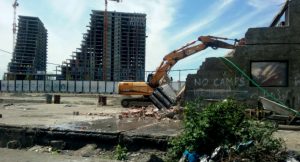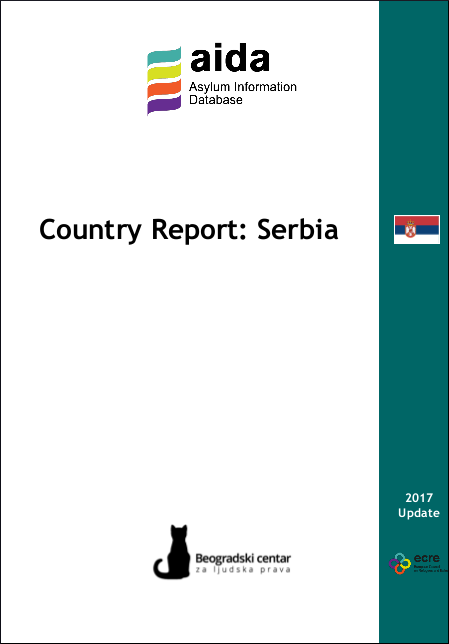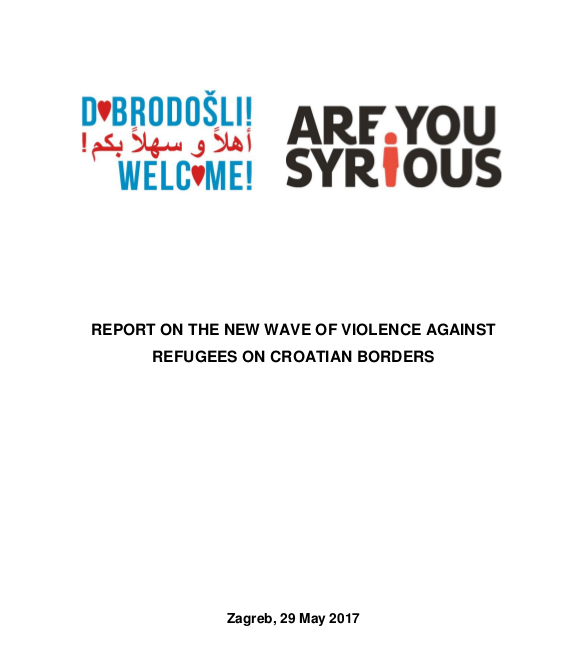Category Archives: Reports
„Europe’s Waiting Room for Refugees: Negotiating Borders and Performing Resilience in Serbia“
This post is based on fieldwork I conducted in Serbia between July-August 2017. I conducted thirty semi-structured interviews and five weeks of participant observation with male Afghan refugees in order to understand how they are coping with their limited mobility due to closed borders along the Balkan route and restrictive asylum procedures. Despite the precarious state of limbo that these men are living in while they attempt clandestine border crossings, many of them claimed that life in Serbia was better than in Afghanistan. The men I met invariably used the term ‘refugees’ to describe themselves, despite not having been granted this status. To respect their self-identification, I will use this word to refer to them in this post. The accompanying photographs were taken by photographer Jenny Brover and are used with her permission. All names in this piece have been changed to respect the privacy of those I interviewed.
Serbian NGO’s pressured to campaign for president Vucic
The story of a 10-years old boy from Afghanistan who is residing since last winter with his family in Krnjaca AC* in Serbia and remarkably talented with portraying and drawing fascinated media and people not only in Serbia, but made headlines in whole Europe. After he had an exhibit last week (09.08.) in a café in Belgrade to raise money for a Serbian child’s post-cancer therapy, last Wednesday (16.08.) he and his family were invited by Serbia’s President and Prime Minister Aleksandar Vucic. Personally Vucic promised a scholarship for Farhad and offered the whole family the Serbian citizenship in case they decide to stay in Serbia which would be a great honor for his country. As well he praised Serbia as a nation that would “sincere welcome” Asylum seekers and underlined the perspectives for the family to built up a great future in Serbia.¹
Volunteers working with Serbian NGO’s report that their organizations get pressured by representatives to spread the news of Vucic’s offer and publish pictures of the meeting on their social media platforms and web sides if “they want to stay in good terms with [the Serbian authorities]”.
Current situation in Sombor TC: rising tense
In the fringe area of Sombor, a charming Serbian town with around 60.000 habitants, less than 20km to the Croatian and less then 40km distance to the Hungarian border, a temporary refugee camp (Transit Center*) opened in the beginning of November 2016 as one of nine temporary shelters built up from autumn 2016 until spring 2017 in order to accommodate the increasing number of refugees in Serbia at this time.
Since several weeks people staying in Sombor TC feel more and more stress triggered by enforced relocations to the closed camp Presovo, the presence of fascists & racist violations from locals and pressure from the camp’s authority.
Number of refugees in Serbia descending & involuntary relocations
According to the UNHCR reports 5200 people on the move and asylum seekers are currently living in Serbia. Since March 2017 that number is descending constantly coming along with a decreasing number of migrants arriving in Serbia primarily from Bulgaria and Macedonia. After the eviction and destruction of the „barracks“* in Belgrade in May 2017 more than 1000 refugees who were living there have been relocated from the city center to official camps all over Serbia.
Einzellfalldokumentation der Gewalt an der serbisch-ungarischen Grenze
The following interviews were conducted by our volunteers starting in January of this year, following human rights reporting guidelines drafted by the Hungarian Helsinki Committee. Unless otherwise stated, all interviews were recorded and conducted in the victim’s native language through our translator. Personal identifying information has been removed for reasons of safety and anonymity.
REPORT ON THE NEW WAVE OF VIOLENCE AGAINST REFUGEES ON CROATIAN BORDERS
Rückblick: Balkanroute im Frühjahr 2017

11. Mai 2017. Die Baracken in Belgrad werden geräumt und wieder verschwindet ein sichtbarer Ort der Migration von der Bildfläche. Ein Bericht über die Proteste in Serbien und Ungarn und die Räumung der Baracken, der gleichmaßen Analyse und Rückblick ist, geschrieben vom Feministischen Kollektiv.
ARD: Tod auf der Balkanroute – Ein Vater und ein Grab in Südserbien (+ Audio)
Etwa eine Million Menschen passierten auf ihrer Flucht vor Krieg und Elend im Nah- und Mittleren Osten meine Heimat Serbien. Wegen der Lage vor den Toren der EU ist diese für die meisten so etwas wie ein „Sprungbrett“ für den letzten und entscheidenden Schritt – die legale oder illegale Überquerung der ungarischen oder kroatischen Grenze. Nicht alle schafften aber diesen Weg in die bessere Zukunft, das Schicksal wollte es einfach nicht. Sie ertranken nicht zu Hunderten und Tausenden, so wie im Mittelmeer, aber sie starben auch und das in unserer unmittelbaren Nähe. Gerade deswegen möchten wir, vom ARD-Team Südosteuropa, diesen Opfern des Schicksals ein Gesicht geben und ihre Geschichte erzählen.
New Report: A DANGEROUS ‘GAME’ – The pushback of migrants, including refugees, at Europe’s borders
In 2015 and 2016, more than a million people arrived in Europe after crossing the sea from Turkey to Greece and continuing their journey along the so-called Western Balkan route. In response, European Union Member States and other European countries hastily erected fences on their borders. In March 2016, Slovenia, Croatia, Serbia and former Yugoslav Republic of Macedonia shut their borders and left thousands
of people stuck in limbo, many in inadequate or unsafe accommodation.At present, there are about 7,800 displaced people in Serbia, and 350 people in Macedonia. Many of these people have come from conflict affected countries seeking protection, including Afghanistan, Pakistan, Iraq and Syria. Roughly 1,100 of those in Serbia and over 200 in Macedonia are not housed in government-run facilities and are forced to sleep rough.
Rather than being places of safety, countries on the Western Balkan route have failed to offer protection or due process to many new arrivals and instead have pushed them back to their previous country of transit or even another country, without giving them a chance to claim asylum.
Pushbacks are happening in different ways. Hungary and Croatia – both EU member states – have used brutal tactics, such as attack dogs and forcing people to strip naked in freezing temperatures. The Serbian authorities have generated a climate of fear and uncertainty amongst migrants by expelling groups of people who have been legally registered and were expecting to receive their right to an individual hearing. This
practice meant that in mid-winter, in freezing temperatures of -20oC, people were afraid to stay in government centres for fear of being pushed back to Macedonia or Bulgaria. Interviewees also accused Bulgarian authorities of treating people in such a brutal manner that they are afraid to return.The people who are moving through the Balkans, with cynical humour, call their efforts to continue their dangerous journey the ‘game’, a cruel ‘game’ where safety and protection are replaced with violence and intimidation from people in authority. As they attempt to move to a place of safety, people are forced to take enormous risks and suffer abuse at the hands of people smugglers, brave freezing temperatures in winter
and negotiate unknown and dangerous terrain, including forests and fast-flowing rivers. This is an often terrifying situation where beatings, dog attacks and robbery are rife, leading to serious injuries and even death. No one, regardless of their reason for moving via the Western Balkans route, should experience the violence and aggression which is being used by authorities. For refugees and others who have the right to
international protection from persecution and serious human rights violations, pushbacks stand in the way of seeking protection and enjoying their right to an individual assessment of their claims. Brutality, intimidation and devious tactics by authorities also engender a climate of fear and mistrust amongst people on the move. This report aims to firmly
put the spotlight on the acts of abuse being perpetrated by state authorities, and the failure of European countries to uphold people’s rights. We are calling for the responsible governments to immediately change their practises and hold perpetrators accountable.Oxfam and its partners, the Belgrade Centre for Human Rights (BCHR) and the Macedonian Young Lawyers Association (MYLA), are providing support to migrants, including refugees, in Serbia and Macedonia. Together, we call on the governments of Serbia, Macedonia, Croatia, Hungary and Bulgaria to:
• Immediately review all procedures at their borders to ensure that they are in compliance with Article 3 of the European Convention on Human Rights (ECHR), i.e. the prohibition on inhumane and degrading treatment, and Article 4 of Protocol No. 4 to the ECHR, i.e. the principle of non-refoulement and the prohibition of collective expulsions. Also, ensure that the quality and outcome of these procedures can be scrutinized before a national authority, including by providing access to an effective remedy, in compliance with Article 13 of the ECHR.
• Conduct an independent and rigorous assessment of each individual’s claim for international protection in order to ensure that they have access to an individual asylum determination procedure, with full rights to representation and interpreter services and with the right to appeal the decision, with any deportation proceedings suspended pending the outcome of the appeal.
• Urgently investigate and take action against all perpetrators of crimes against migrants, including all forms of inhuman or degrading treatment by law enforcement officers, physical violence, and robbery
• Introduce preventive measures against future violations, including a rigorous hiring process for law enforcement officers before deployment, incorporation of improved technical equipment such as body-worn cameras, and mandatory training on European and international human rights and refugee law. A high level of applicants to the Hungarian police force did not pass a psychological test in 2016. Therefore all officers hired in 2015 – at the peak of the crisis in Hungary – should also be required to undertake a psychological test
and any who do not pass must be removed from the force
immediately.• Allow Ombudsman offices (in charge of existing National Preventive Mechanisms) and relevant civil society to have full and unimpeded access to border areas in all the countries concerned as a matter of urgency as outlined in Article 3 and 4 of the Optional Protocol to the Convention against Torture and other Cruel, Inhuman or Degrading Treatment or Punishment.


